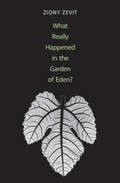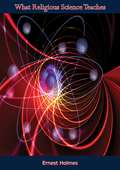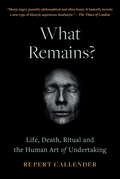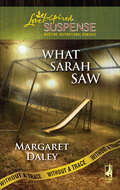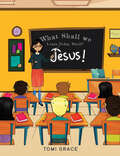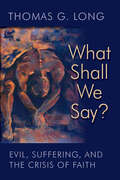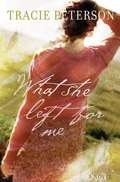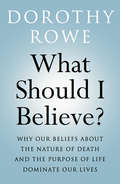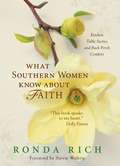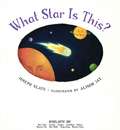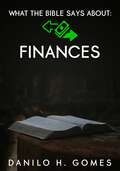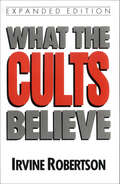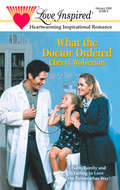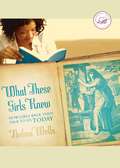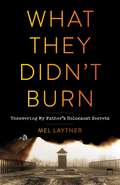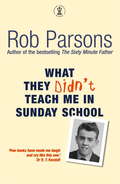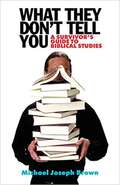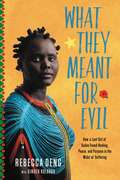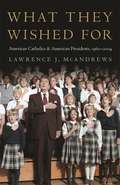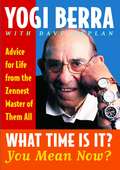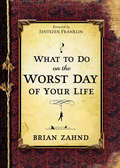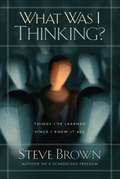- Table View
- List View
What Really Happened in the Garden of Eden?
by Ziony ZevitA provocative new interpretation of the Adam and Eve story from an expert in Biblical literature.The Garden of Eden story, one of the most famous narratives in Western history, is typically read as an ancient account of original sin and humanity&’s fall from divine grace. In this highly innovative study, Ziony Zevit argues that this is not how ancient Israelites understood the early biblical text. Drawing on such diverse disciplines as biblical studies, geography, archaeology, mythology, anthropology, biology, poetics, law, linguistics, and literary theory, he clarifies the worldview of the ancient Israelite readers during the First Temple period and elucidates what the story likely meant in its original context.Most provocatively, he contends that our ideas about original sin are based upon misconceptions originating in the Second Temple period under the influence of Hellenism. He shows how, for ancient Israelites, the story was really about how humans achieved ethical discernment. He argues further that Adam was not made from dust and that Eve was not made from Adam&’s rib. His study unsettles much of what has been taken for granted about the story for more than two millennia—and has far-reaching implications for both literary and theological interpreters.&“Classical Hebrew in the hands of Ziony Zevit is like a cello in the hands of a master cellist. He knows all the hidden subtleties of the instrument, and he makes you hear them in this rendition of the profoundly simple story of Adam, Eve, the Serpent, and their Creator in the Garden of Eden. Zevit brings a great deal of other biblical learning to bear in a surprisingly light-hearted book.&”―Jack Miles, author of God: A Biography
What Religious Science Teaches: A New Thought Primer
by Ernest HolmesReligious Science is not a personal opinion, nor is it a special revelation. It is a result of the best thought of the ages. It borrows much of its light from others, but in so doing, robs no one, for Truth is universal.The Christian Bible, perhaps the greatest book ever written, truly points a way to eternal values. But there are many other bibles, all of which taken together weave the story of spiritual Truth into a unified pattern.All peoples have had their bibles, as all have had their religions; all have pointed a way to ultimate values, but can we say that any of them has really pointed the way? It is unreasonable to suppose that any one person, or people, encompasses all truth, and that they alone can reveal the way of life to others.Taking the best from all sources, Religious Science has access to the highest enlightenment of the ages. Religious Science reads everyman’s bible and gleans the truths contained therein. It studies all peoples’ thought and draws from each that which is true. Without criticism, without judgment, but by true discrimination, that which is true and provable may be discovered and put to practical use.What is Truth? Where may it be found? And how used? These are the questions that intelligent people ask. They find their answer in the study of Religious Science. Shorn of dogmatism, freed from superstition, and always ready for greater illumination, Religious Science offers the student of life the best that the world has so far discovered.It has been well said that “religions are many, but Religion is one.” The varying faiths of humankind are unnumbered, but the primal faith of the race is today, as of old, the One Faith; an instinctive reliance upon the Unseen, which we have learned to call God.Religion is One. Faith is One. Truth is One.
What Remains?: Life, Death and the Human Art of Undertaking
by Rupert Callender‘This book is a great work of craft and beauty.’ Salena Godden ‘This compelling personal story of a pioneering punk undertaker is a moving revelation.’ Love Reading ‘Inspiring and unforgettable.’ John Higgs, author of William Blake vs the World Death has shown me...the unbreakable core of love and courage that lies at the heart of what it means to be human. Ru Callender wanted to become a pioneering undertaker in order to offer people a more honest experience than the stilted formality of traditional ‘Victorian’ funerals. Driven by raw emotion and the unresolved grief of losing his own parents, Ru brought an outsider, ‘DIY’ ethos to the business of death, combined with the kinship and inspiration he found in rave culture, social outlaws and political nonconformists. Ru has carried coffins across windswept beaches, sat in pubs with caskets on beer-stained tables, helped children fire flaming arrows into their father’s funeral pyre, turned modern occult rituals into performance art and, with the band members of the KLF, is building the People’s Pyramid of bony bricks in Liverpool – all in the name of creating truly authentic experiences that celebrate those who are no longer here and those who remain. Radical, poignant, unflinchingly real and laugh-aloud funny, What Remains? will change the way you think about life, death and the human experience.
What Remains?: Life, Death and the Human Art of Undertaking
by Rupert CallenderDeath is not my friend, neither is it my enemy; it is my destiny."Part memoir, part rant against the traditional funeral business, part manifesto, part just musing on death and facing it with compassion and courage. It&’s lovely and thoughtful and may make you rethink a few things."—The Guardian"This book is a great work of craft and beauty."—Salena Godden, author of Mrs Death Misses DeathWhen he became an undertaker, Rupert Callender undertook to deal with the dead for the sake of the living. What Remains? is the brilliant, unforgettable story of the life and work of the world&’s first punk undertaker—but it is also a book about ordinary, everyday humanity and our capacity to face death with courage and compassion. To say goodbye to the people we love in our own way.In becoming the world&’s first &“punk undertaker&” and establishing the Green Funeral Company in Devon, UK, Ru Callender and his partner Claire challenged the stilted, traditional, structured world of the funeral industry; fusing what he had learned from his own deeply personal experiences with death, with the surprising and profound answers and raw emotion he discovered in rave culture and ritual magick.From his unresolved grief for his parents and his cultural ancestors to political and religious non-conformists, social outlaws, experimental pioneers, and acid house culture, Ru Callender has taken to an outsider &“DIY&” ethos to help people navigate grief and death. He has carried coffins across windswept beaches, sat in pubs with caskets on beer-stained tables, helped children fire flaming arrows into their father&’s funeral pyre, turned modern occult rituals into performance art and, with the band members of KLF, is building the People&’s Pyramid of bony bricks in Liverpool.What Remains? is a profound, deeply moving, and politically charged book that will change the way readers think about life, death, and the all-important end-of-life experience. &“Rupert Callender hope[s] to redefine the funeral.&”—The Telegraph&“Death has shown me unimaginable horror, the unbreakable core of love and courage that lies at the heart of what it means to be human.&”—Rupert Callender, from What Remains?
What Sarah Saw (Without a Trace #1)
by Margaret DaleyA missing persons case—and its three-year-old witness—reunites a former couple in the first romantic suspense thriller in the Without a Trace series.The only witness when a single mother mysteriously vanishes? Her three-year-old daughter. FBI agent Sam Pierce needs to question little Sarah. Yet child psychologist Jocelyn Gold will barely let him near the girl. Or herself. The tragic conclusion to a kidnapping case broke Sam and Jocelyn apart years before, and their hearts still haven’t healed. But for the child’s sake—and her mother’s—they must join forces to uncover just what Sarah saw.
What Shall We Learn Today, Mrs.H?: Jesus!
by Tomi GraceIn What Shall We Learn Today, Mrs.H?, I journey back to the wonder of seeing the world through a child’s eyes, rediscovering the awe and simplicity often lost in adulthood. While my own childhood was unlike those I now write about, it has highlighted the importance of nurturing a childlike mindset, especially as a Christian. This book offers young readers a joyful exploration of faith, introducing them to Jesus in a way that is both delightful and enduring. Through engaging tales and biblical lessons, I invite children everywhere to begin a faith-filled adventure, where learning becomes a moving experience they will cherish forever.
What Shall We Say?: Evil, Suffering, and the Crisis of Faith
by Thomas G. LongTsunamis, earthquakes, famines, diseases, wars &mdash these and other devastating forces lead Christians to ask painful questions. Is God all-powerful? Is God good? How can God allow so much innocent human suffering?These questions, taken together, have been called the "theodicy problem," and in this book Thomas Long explores what preachers can and should say in response. Long reviews the origins and history of the theodicy problem and engages the work of major thinkers who have posed solutions to it. Cautioning pastors not to ignore urgent theodicy-related questions arising from their parishioners, he offers biblically based approaches to preaching on theodicy, guided by Jesus' parable of the wheat and the tares and the "greatest theodicy text in Scripture" -- the book of Job.
What She Left for Me
by Tracie Peterson- A contemporary stand-alone novel from bestselling author Tracie Peterson. Three generations of women who have experienced betrayal learn to experience God's forgiveness and healing. A moving family saga that will appeal to Tracie's faithful historical fans as well as lovers of contemporary Christian fiction
What Should I Believe?: Why Our Beliefs about the Nature of Death and the Purpose of Life Dominate Our Lives
by Dorothy RoweSuddenly, in the twenty-first century, religion has become a political power. It affects us all, whether we’re religious or not. If we’re not in danger of being blown up by a suicide bomber we’ve got leaders to whom God speaks, ordering them to start a war. We’re beset by people who demand that we give ourselves to Jesus while they smugly assure us of their own superiority and inherent goodness. We’re surrounded by those who noisily reject science while making full use of the benefits science brings; by the ‘spiritual’ ones; the ones who believe in magic; and there’s the militant atheists berating us all for our stupidity. We wouldn’t object to what people believed if only they’d keep it to themselves. We want to make up our own minds about what we believe, but it’s difficult to do this. Everyone has to face the dilemma that we all die but no one knows for certain what death actually is. Is it the end of our identity or a doorway to another life? Whichever we choose, our choice is a fantasy that determines the purpose of our life. If death is the end of our identity, we have to make this life satisfactory, whatever ‘satisfactory’ might mean to us. If it is a doorway to another life, what are the standards we have to reach to go to that better life? All religions promise to overcome death, but there’s no set of religious or philosophical beliefs that ensures that our life is always happy and secure. Moreover, for many of us, what we were taught about a religion severely diminished our self-confidence and left us with a constant debilitating feeling of guilt and shame. Through all this turmoil comes the calm, clear voice of eminent psychologist Dorothy Rowe. She separates the political from the personal, the power-seeking from the compassionate. She shows how, if we use our beliefs as a defence against our feelings of worthlessness, we feel compelled to force our beliefs on to other people by coercion or aggression. However, it is possible to create a set of beliefs, expressed in the religious or philosophical metaphors most meaningful to us, which allow us to live at peace with ourselves and other people, to feel strong in ourselves without having to remain a child forever dependent on some supernatural power, and to face life with courage and optimism.
What Southern Women Know about Faith: Kitchen Table Stories and Back Porch Comfort
by Ronda Rich Stevie WaltripCome, sip a glass of sweet tea and sit for a spell with Ronda on the porch swing as she tells you stories of happiness and heartache, friends and family, and a faith that’s strong enough to handle anything life throws your way. As Ronda shares, Southerners don’t just talk about God, they have a “kitchen-table faith,” that feels like a comfortable, trusted neighbor who sits down and stays for a good, long visit. It’s a faith you live and breathe, day-in, day-out, whether it’s praying to the good Lord as you sit on the porch swing or finding joy in a delicious pan of cornbread. As Ronda says, Southern faith “is a faith that is plain, simple, and sturdy, that is utilitarian in practice and that fits as comfortably in the hands of Southern women as a baby, an iron skillet, a hair brush, a telephone, or a broom.” From stories of moonshine and revivals, Sunday dinners and new Easter outfits, prayers answered and griefs shared, you’ll discover a faith that supports you when the trials and heartaches of life cause you to stumble, a faith that grabs you by the elbow and steadies you on the path.
What Star Is This
by Joseph SlateThe spiritually enchanted tale of the arrival of Baby Jesus - from Mary and Joseph's journey to Bethlehem to the comet that illuminated the sky for the Wise Men - detailed in lyrical language and stunning illustrations, perfect for Christmastime.
What The Bible Says About: Finances
by Danilo H. GomesThe collection "What the Bible says about" is a set of questions and answers completely based on the Holy Scriptures. Thinking that nowadays, all the truth in the Bible was distorced for egocentrical ideas, this collection of books aims to led Christians through the path of true and nothing more. We must urgently return to the source of wisdom, that is the Word of God. The part of FINANCES of this collection, brings 15 questions (some really polemic) answered based on the Bible, with no human theories or political ideas.
What The Buddha Taught
by Walpola Sri RahulaScholar outlines Buddhist practice referring to writings from Chinese and Tibetan manuscripts not available in English translation.
What The Cults Believe
by Irvine RobertsonAn extensively researched guide to understanding the teachings of major cults and how they deviate from Christianity. Especially helpful in grasping the challenge of the unorganized but pervasive New Age movement.
What The Cults Believe
by Irvine RobertsonAn extensively researched guide to understanding the teachings of major cults and how they deviate from Christianity. Especially helpful in grasping the challenge of the unorganized but pervasive New Age movement.
What The Doctor Ordered
by Cheryl WolvertonCome and meet the folks of Fairweather, Minnesota, the small town with the big heart that you'll want to return to again and again!Dr. Morgan Talbot didn't know what he'd been missing until the day Rachel Anderson White moved back to Fairweather. From the moment they collided in the hall, he was determined to bring joy and laughter back into the lives of Rachel and her young daughter.Rachel had lost her faith and felt that she could trust no one-especially when it concerned her daughter, Lindsay. Yet Morgan's steadfast care soon began to win them both over. Rachel found herself smiling-and falling in love!Could it really be true that wedding vows were just what this doctor ordered?
What These Girls Knew
by Thelma WellsWomen dream, plan, organize, and accomplish great things in this world. What can we learn from those who have gone before us about the wise ways to handle our power as women? Thelma looks at the women of the Bible to help us understand how to be godly women, when to lead, and when to step back and let others shine.
What They Didn't Burn: Uncovering My Father's Holocaust Secrets
by Mel LaytnerWhat if you uncovered a Nazi paper trail that revealed your father to be a man very different from the quiet, introspective dad you knew . . . or thought you knew? Growing up, author Mel Laytner saw his father as a quintessential Type B: passive and conventional. As he uncovered documents the Nazis didn&’t burn, however, another man emerged—a black market ringleader and wily camp survivor who made his own luck. The tattered papers also shed light on painful secrets his father took to his grave. Melding the intimacy of personal memoir with the rigors of investigative journalism, What They Didn&’t Burn is a heartwarming, inspiring story of resilience and redemption. A story of how desperate survivors turned hopeful refugees rebuilt their shattered lives in America, all the while struggling with the lingering trauma that has impacted their children to this day.
What They Didn't Teach Me in Sunday School
by Rob ParsonsA new edition of this best-selling inspirational book which is already an established classic. Some of the lessons learnt along the way will change forever the way we view ourselves, others and especially God. A book filled with fresh starts, new tomorrows and incredible hope.
What They Don't Tell You: A Survivor's Guide to Biblical Studies
by Michael Joseph BrownMichael Brown wants to help students understand the mind-set and presuppositions behind the academic discipline of biblical studies. He uses his experiences as both a student and a teacher to offer wise advice about what to expect if you want to be an astute reader of the Bible. Brown provides basic information about the Bible and biblical criticism. He defines the jargon and and presents the variety of perspectives students will encounter in the classroom. He also clarifies the difference between biblical studies and Bible study, gives a brief history of scholarship, and furnishes an overview of the methods of biblical interpretation.
What They Meant for Evil: How a Lost Girl of Sudan Found Healing, Peace, and Purpose in the Midst of Suffering
by Rebecca DengMany stories have been told about the famous Lost Boys, but now for the first time, a Lost Girl shares her hauntingly beautiful and inspiring story. One of the first unaccompanied refugee children to enter the United States in 2000, after South Sudan's second civil war took the lives of most of her family, Rebecca's story begins in the late 1980s when, at the age of four, her village was attacked and she had to escape. WHAT THEY MEANT FOR EVIL is the account of that unimaginable journey. With the candor and purity of a child, Rebecca recalls how she endured fleeing from gunfire, suffering through hunger and strength-sapping illnesses, dodging life-threatening predators-lions, snakes, crocodiles, and soldiers alike-that dogged her footsteps, and grappling with a war that stole her childhood. Her story is a lyrical, captivating portrait of a child hurled into wartime, and how through divine intervention, she came to America and found a new life full of joy, hope, and redemption.
What They Wished For: American Catholics and American Presidents, 1960-2004
by Lawrence J. McandrewsRoman Catholics constitute the most populous religious denomination in the United States, comprising one in four Americans. With the election of John F. Kennedy as president in 1960, they attained a political prominence to match their rapidly ascending socioeconomic and cultural profile. From Vietnam to Iraq, the civil rights movement to federal funding for faith-based initiatives, and from birth control to abortion, Catholics have won at least as often as they have lost. What They Wished For by Lawrence J. McAndrews traces the role of American Catholics in presidential policies and politics from 1960 until 2004. Though divided by race, class, gender, and party, Catholics have influenced issues of war and peace, social justice, and life and death among modern presidents in a profound way, starting with the election of President Kennedy and expanding their influence through the intervening years with subsequent presidents. McAndrews shows that American Catholics, led by their bishops and in some cases their pope, have been remarkably successful in shaping the political dialogue and at helping to effect policy outcomes inside and outside of Washington. Indeed, although they opened this era by helping to elect one of their own, Catholic voters have gained so much influence and have become so secure in their socioeconomic status--and so confident in their political standing--that they closed the era by rejecting one of their own, voting for George W. Bush over John Kerry in 2004.
What Time Is It? You Mean Now?
by Yogi Berra Dave KaplanCould Confucius hit a curveball? Could Yoda block the plate? Can the Dalai Lama dig one out of the dirt? No, there is only one Zen master who could contemplate the circle of life while rounding the bases. Who is this guru lurking in the grand old game? Well, he's the winner of ten World Series rings, a member of both the Hall of Fame and the All-Century Team, and perhaps the most popular and beloved ballplayer of all time. And without effort or artifice he's waxed poetic on the mysteries of time ("It gets late awful early out there"), the meaning of community ("It's so crowded nobody goes there anymore"), and even the omnipresence of hope in the direst circumstances ("It ain't over 'til it's over"). It's Yogi Berra, of course, and in What Time Is It? You Mean Now? Yogi expounds on the funny, warm, borderline inadvertent insights that are his trademark. Twenty-six chapters, one for each letter, examine the words, the meaning, and the uplifting example of a kid from St. Louis who grew up to become the consummate Yankee and the ultimate Yogi.
What To Do On The Worst Day Of Your Life
by Brian ZahndNobody knew adversity like King David. He was called and anointed to reign in life, and yet he had to find a way in God to keep form losing it all. In What to Do on the Worst Day of Your Life,Brian Zahnd looks into the life of David to discover a pattern of faith we can apply to overcome life&’s daunting obstacles. In David&’s story we find a timeless model for how to encounter God&’s restorative power in the midst of deep tragedy. Join Brian Zahnd, and see what David did on his worst day. You&’ll see David weep but not get bitter. You&’ll see him reorient his vision and regain his passion. All along the journey you&’ll be reminded that God&’s great work in David&’s life was not an odd, one-off miracle but a pattern of faith for all who are facing the worst day of their life.
What Was I Thinking?
by Steve BrownSeminary professor, radio broadcaster, and former pastor Steve Brown is tired. He confesses, "I'm tired of glib answers to hard questions, irrelevant 'God words' and stark, cold foundations on which no house has ever been built." So he set out to revitalize his faith by reexamining his thoughts and his faith. And he shares his invigorating discoveries with readers. A potent tonic for those whose faith feels flat, What Was I Thinking? fully engages the heart, mind, and soul.
